 Beatrice Loayza
Beatrice Loayza
A Rock and a soft place: in Benny Safdie’s biopic, Dwayne Johnson plays UFC champ Mark Kerr as a brawler with a big heart.
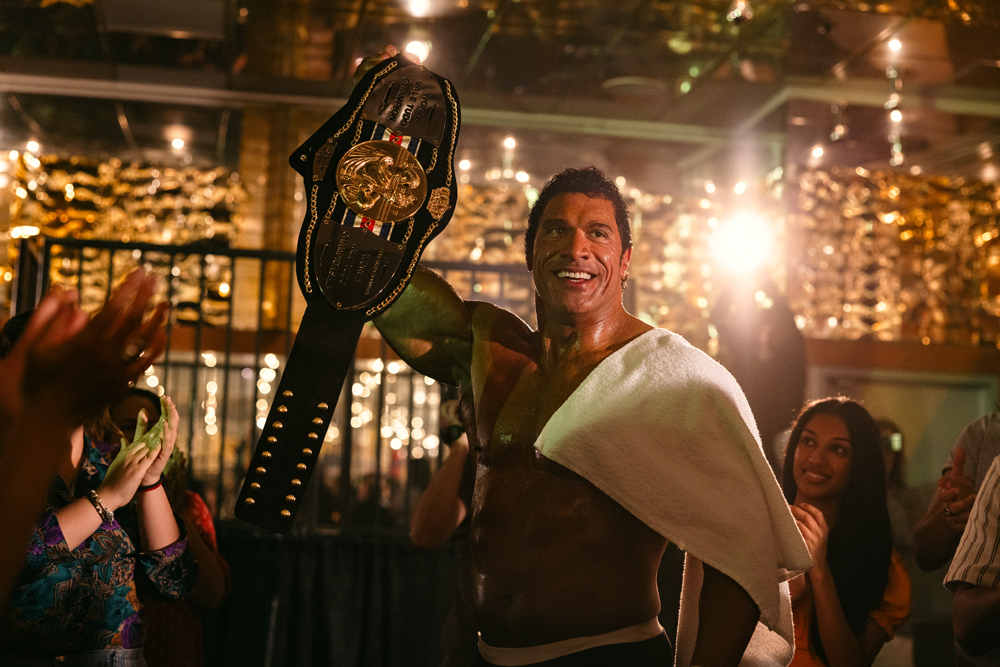
Dwayne Johnson as Mark Kerr in The Smashing Machine. Courtesy A24. Photo: Eric Zachanowich.
The Smashing Machine, written and directed by Benny Safdie,
opening in theaters October 3, 2025
• • •
In 1996, a year before the events of Benny Safdie’s The Smashing Machine begin, Senator John McCain attempted to enact a legislative ban on the Ultimate Fighting Championship (UFC), a mixed-martial-arts organization that had staged its first tournament earlier that decade and gone on to generate a barrage of bad press for its spectacular displays of lawless pugilism. Eye-gouging and biting is verboten, but most everything else is fair game. McCain called it “human cockfighting,” but he was just a wet blanket. Today, the UFC is not only a multibillion-dollar sports organization but also the de facto presidential sport, with plans currently underway for the White House to host a UFC fight in honor of the country’s 250th anniversary in 2026.

Dwayne Johnson as Mark Kerr (right) in The Smashing Machine. Courtesy A24. Photo: Eric Zachanowich.
Given the normalized brutality and stark individualism of mixed martial arts, it’s no surprise that an enterprise like the UFC would eventually define itself around a right-wing fanbase. The company’s “eat what you kill” business model, in which a few select fighters make bank while the rest are sent to slaughter for less than the national average salary, props up fantasies of merit-based triumph. Humble plumber’s apprentices (Conor McGregor), construction workers (Merab Dvalishvili), and scrappy immigrants from the most impoverished parts of the world (Khabib Nurmagomedov) can go on to become kings if they’re tough enough. This is precisely the kind of dog-eat-dog desperation that marks the tragic protagonists in the last two movies Benny Safdie codirected with his brother, Josh: Good Time (2017) and Uncut Gems (2019). The Smashing Machine—Benny’s first solo directing effort, a biopic of the UFC legend Mark Kerr (Dwayne Johnson)—also centers a larger-than-life figure with delusions of grandeur.
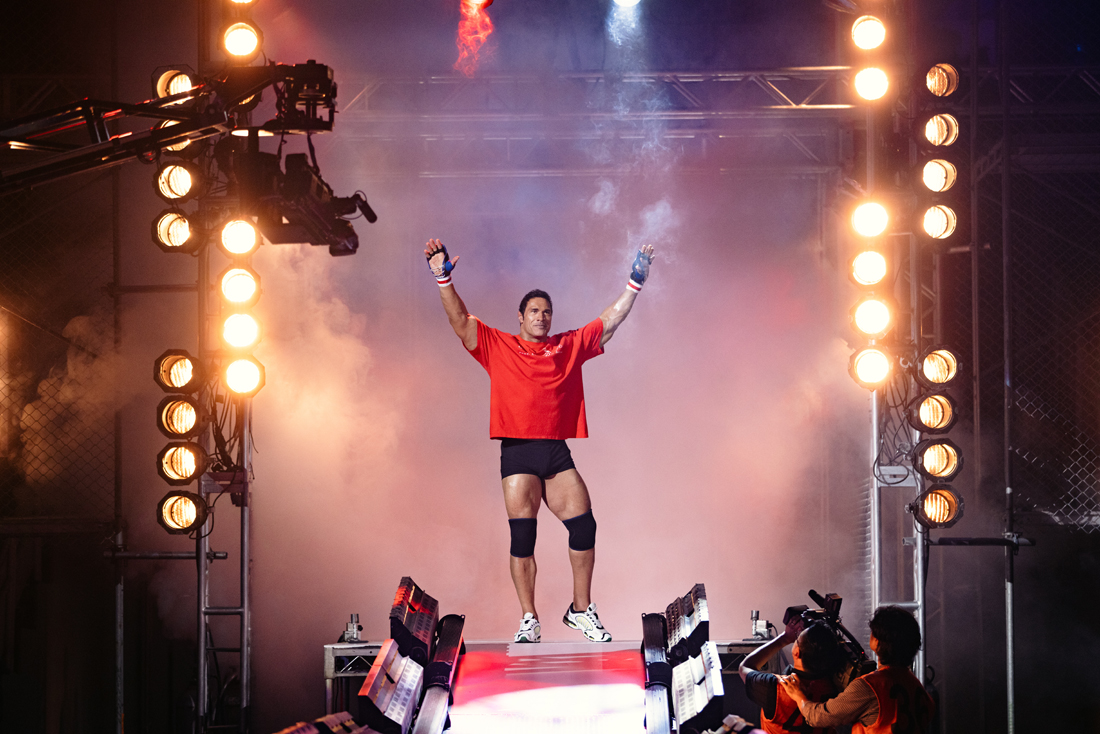
Dwayne Johnson as Mark Kerr in The Smashing Machine. Courtesy A24. Photo: Eric Zachanowich.
Though, when this hulking hero leaves the ring, the crash-out is relatively sedate. There’s nothing too damning in the film, despite its hearty showcase of pummeled flesh and painkiller abuse—which makes it a weirdly conventional drama, neither too critical of the sport’s obvious dangers nor too idolatrous of its brotherhood of big lads simply trying to make a living. This both-sides spectacle is boosted by the involvement of Kerr himself, as well as the movie’s cast of active and retired MMA fighters.
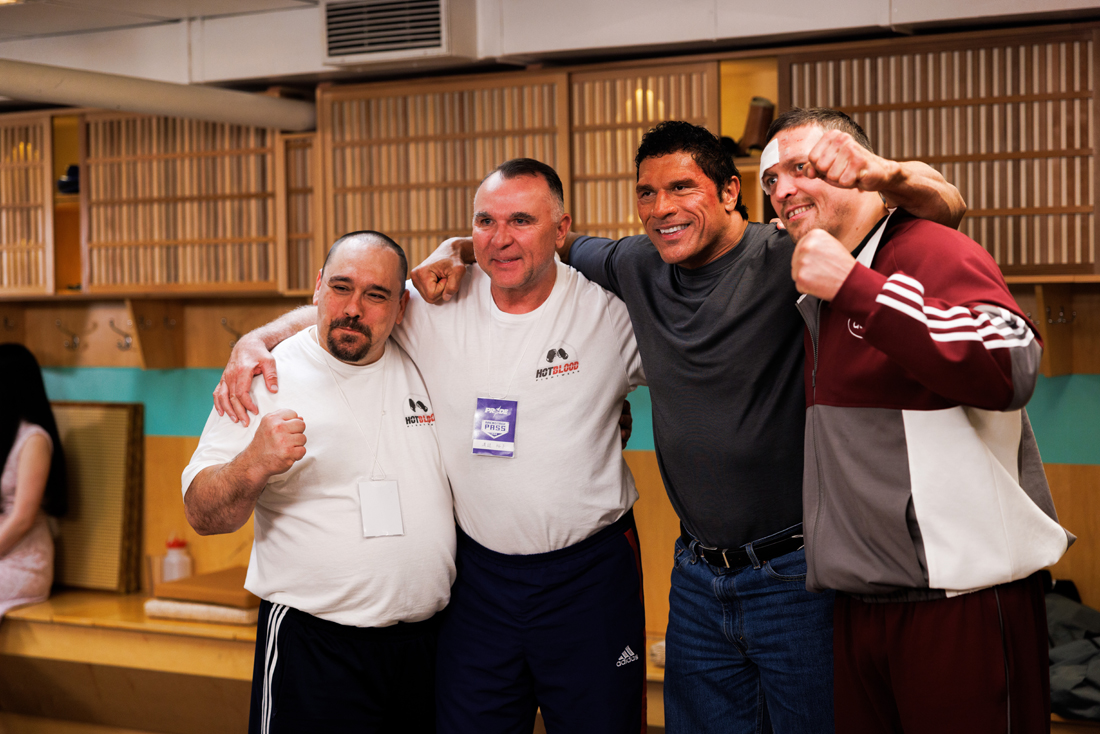
Dwayne Johnson as Mark Kerr (second from right) and Oleksandr Usyk as Igor Vovchanchyn (far right) in The Smashing Machine. Courtesy A24. Photo: Eric Zachanowich.
The title refers to Kerr’s moniker, but it’s also an allusion to the man playing him, who started out as a pro wrestler known as “the Rock” before pivoting to Hollywood in the early aughts. The Smashing Machine subverts our preconceptions of macho men, demonstrating—like other enlightened grappling dramas before it, from The Wrestler (2008) to The Iron Claw (2023)—how the best brawlers are big softies, too. The extent to which you find that this now well-established tweaking of type still has any bite will largely depend on your feelings about Johnson, the charismatic yet monotonously risk-averse star of some of the most expensive, inane, and critically reviled action-abominations of the past decade (Rampage, 2018; Red Notice, 2021). A challenge, if not a redirection, has long been warranted.
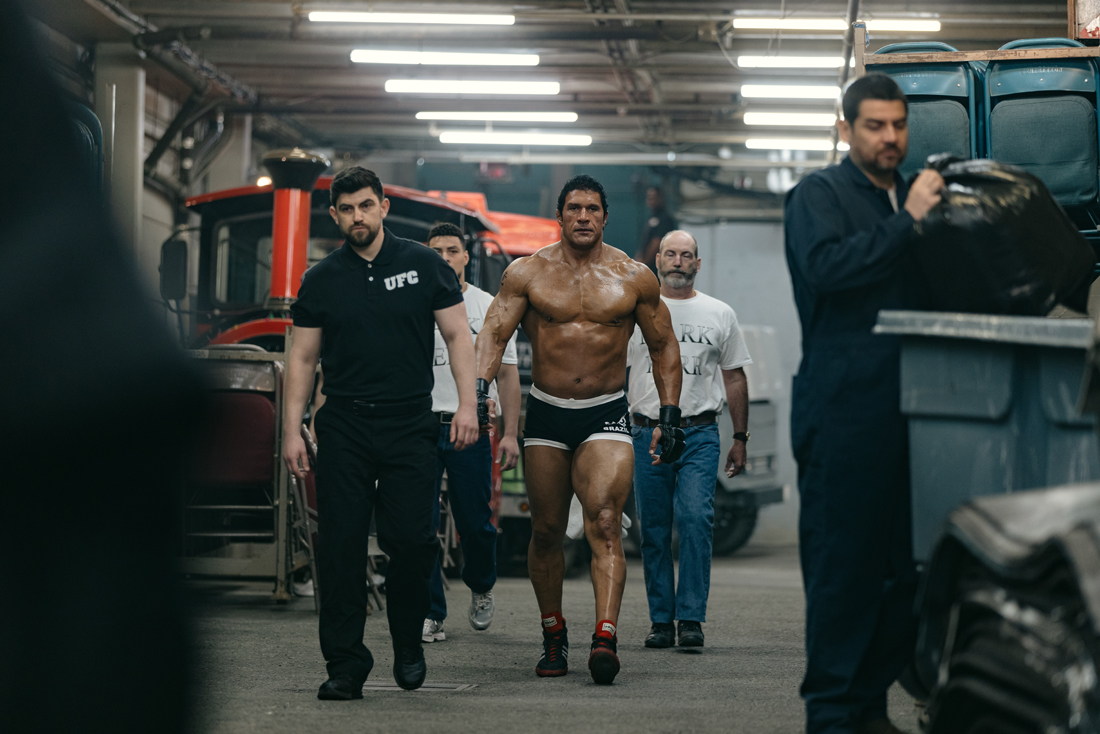
Dwayne Johnson as Mark Kerr (center) in The Smashing Machine. Courtesy A24. Photo: Eric Zachanowich.
Equipped with facial prosthetics to mangle his amiable mug, Johnson-as-Mark is introduced mid-fight, crushing his opponent’s face into the mat. In voice-over from an off-screen interview, Mark expands on his fighting philosophy, his affable delivery in eerie tension with the on-screen savagery. Besides paying the bills through blood sport, he’s otherwise, apparently, a really nice guy: striking up conversations with grannies, admiring sunsets, and more than once using the word “tummy” to discuss his digestive issues. His male friendships also allow for some touching displays of radical vulnerability. When Mark is hospitalized after an opioid overdose, Mark Coleman (MMA phenom Ryan Bader), Mark’s former trainer, current competitor, and forever bestie, gets on the first flight to Phoenix to visit his bro—moving the Smashing Machine to burst into tears, which feels as shocking as watching him get kneed in the head.

Ryan Bader as Mark Coleman, Dwayne Johnson as Mark Kerr, and Oleksandr Usyk as Igor Vovchanchyn in The Smashing Machine. Courtesy A24. Photo: Eric Zachanowich.
Mark’s addiction struggles in the film’s first half allow Johnson to unleash his dramatic prowess. While under the influence, Mark’s eyes go dead, his eyeballs jittering in their sockets like plastic props. When he struts out into the arena to meet his next opponent, Johnson’s pearly whites shine through the world’s stiffest smile, underscoring the awkward artifice of Mark’s showmanship. A high-strung control freak in Nautica polos, Mark promptly checks himself into rehab after his hospital stay—and waltzes back out, a new man, a few weeks later. But the drugs aren’t his biggest problem. That honor goes to Dawn (Emily Blunt), Mark’s manipulative girlfriend—his mommy when he’s intoxicated, and, later, a suicidal tyrant when he threatens to break things off. The two are undeniably terrible for each other, but their relationship positions the film’s examination of Johnson’s masculinity in intriguing ways.

Emily Blunt as Dawn Staples and Dwayne Johnson as Mark Kerr in The Smashing Machine. Courtesy A24. Photo: Ken Hirama.
Some critics have noted the absence of sexuality in the actor’s more popular roles, a condition of the family-friendly blandness of those movies, combined with a general discomfort about the libidos of Black men. Yet Johnson’s good looks have always had a cartoonish quality about them. There’s something about his massive frame and bulging muscles, matched with his baby-brown eyes and broad, shiny smile, that’s always conferred a sort of stunted manhood—like a kid playing Superman by himself. In his best roles—as a mock action hero in Richard Kelly’s Southland Tales (2006) and a naive Jesus-freak in Michael Bay’s Pain & Gain (2013)—the dissonance between his physique and his sensitive, innocent demeanor is played for laughs. When Mark loses his cool after Dawn discovers he’s still using, the ease with which he rips through the kitchen door reminds us how easily Dawn herself could be in danger, limning their interactions with a degree of risk—yet one that is never eroticized. In other scenes, when Dawn wraps her arms around a fragile Mark’s monstrous torso, the effect is ludicrously maternal: stop coddling the overgrown baby! Mark’s neuroticism—his fussing over protein shakes and leaves in the pool—and his genial air of propriety add to this man-child sexlessness.
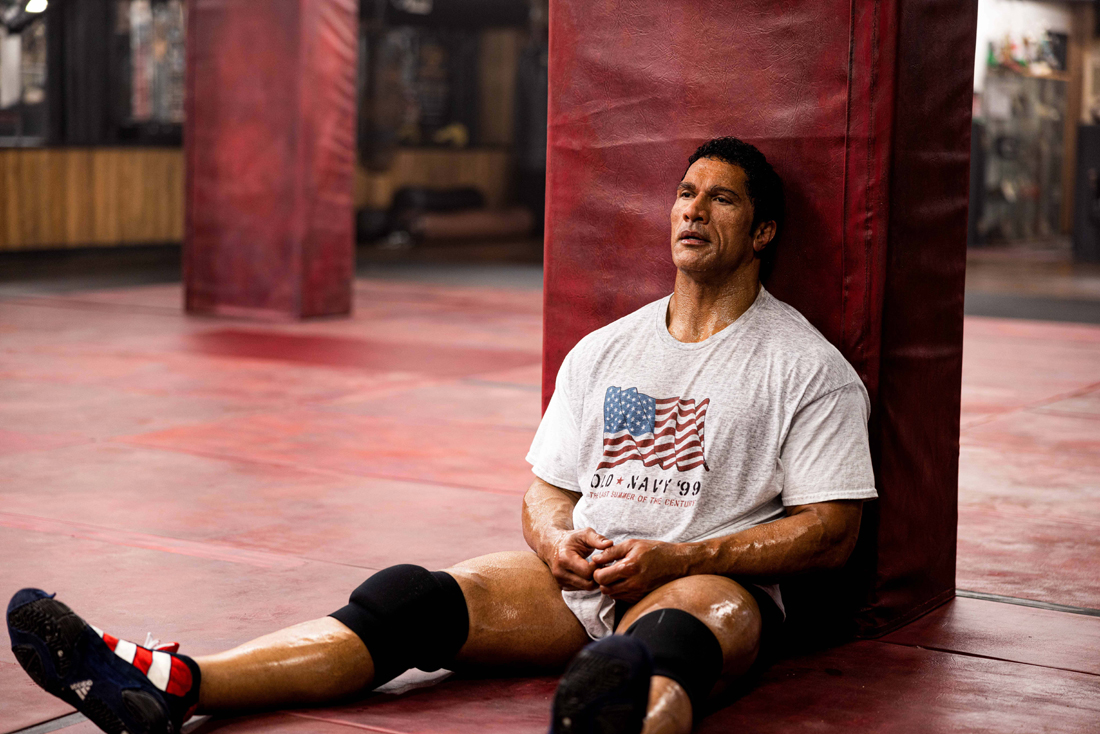
Dwayne Johnson as Mark Kerr in The Smashing Machine. Courtesy A24. Photo: Eric Zachanowich.
This neutering is bizarre, considering how Johnson’s on-screen persona has for too long entailed being the biggest, strongest, and manliest of them all. This branding has sometimes clashed, embarrassingly, with that of other big, strong male stars—as in the 2019 Fast & Furious spin-off Hobbs & Shaw, in which both Johnson and costar Jason Statham were revealed to have “fight-scene parity” clauses in their contracts that ensured neither one of them would get disproportionately clobbered by the other. When Mark is asked by a Japanese reporter how he would react if he lost a match, he answers with a kind of willfully guileless defiance: “I don’t know what that feels like because I’ve never lost.” At the end of The Smashing Machine, Mark gets the shit beaten out of him—as much a rarity for him as for Johnson. His buddy Coleman takes the crown and Mark takes a shower, processing his dethronement as he comes to accept that he’s not invincible, not Godlike—and that’s OK. The Smashing Machine is a coming-of-age film.
Beatrice Loayza is a writer and editor who contributes regularly to the New York Times, the Criterion Collection, Film Comment, the Nation, and other publications.